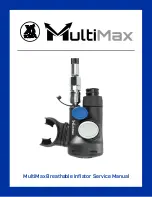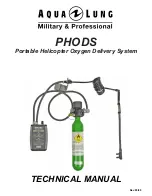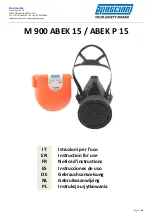
Page 7
3. Preparation
Inserting the batteries (included)
1. If the electrode cable is wound
around the the cable winder,
unwind it.
2. Use a Phillips screwdriver to
remove the two screws holding
the battery cover. See Figure B.
3. Lift meter stand to expose
battery cover.
4. Remove battery cover.
5. Insert batteries. Make sure
polarity is correct.
6. Replace the battery cover into
its original position using the
two screws removed earlier.
Place the meter stand in the
folded position.
Connecting the electrode and the
temperature probe
Meter accepts any pH, ORP or ISE
electrode with a BNC connector.
The temperature sensor connects to
the meter using a phono jack for the
temperature probe.
Connecting the pH electrode. Hook up
the electrode to the male BNC jack on the
top of the meter as shown in Figure C.
Make sure connector is clean and dry.
Temperature probe. The temperature
probe uses a phono jack to connect with the socket on the meter. Insert the
jack into socket as shown in Figure C. If you are using an OAKTON “All-In-One”
electrode, the temperature sensor is built in to the pH electrode and the one
electrode cable will have both a BNC connector for pH and a phono jack for
temperature.
Page 6
These 2 screws hold the
battery cover in place.
B
Meter
stand
BNC
connector
phono
jack
C
Attaching the electrode holder to the meter
1. Place the electrode holder with the flange
facing the slot on the meter.
2. Gently slide the flange of the holder in the slot
(See Figure D at left). Make sure holder is fixed
properly into the slot.
You can attach the electrode holder in different
positions, as shown in Figure E. This flexibility
facilitates one-hand operation.
Inserting electrode into the electrode holder
The meter includes one electrode holder. Make
sure to insert the electrode into the holder
gently, or the electrode may break.
1. Insert the electrode into the opening of the
holder until the top housing of the electrode
touches the top of the holder as shown in
Figure E. Do not force the electrode into the
opening.
NOTE: If you substitute the electrode, you
need to use an electrode with a 12 mm
diameter. Otherwise, the electrode may
not fit properly.
Connecting the AC adapter (not
included; order on page 21)
1. Insert the AC jack as shown in
Figure F at right.
2. Switch off the meter before plugging
the adapter into the power source.
This safety precaution protects the
software in your meter.
3. Switch on the meter power.
F
E
D
Summary of Contents for pH 10 Series
Page 13: ...DISTRIBUTED BY ...































